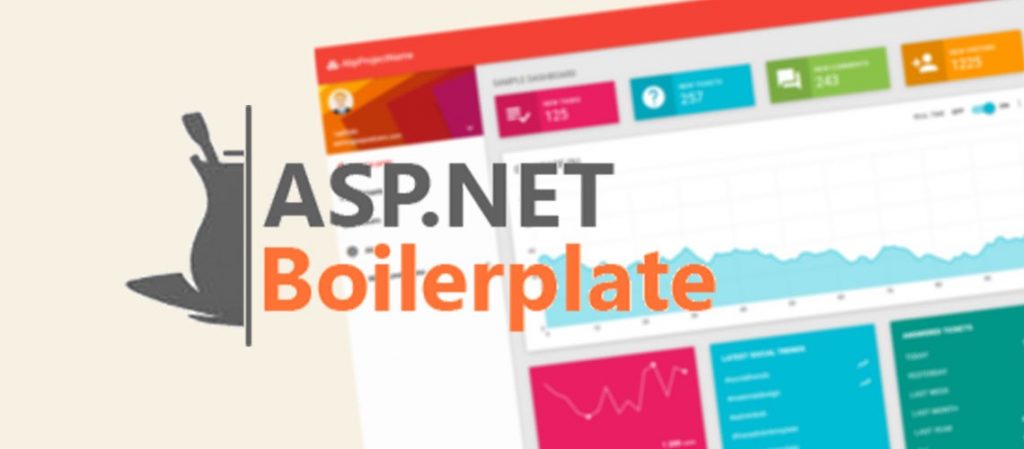In 2016, Microsoft announced ASP.NET Core 1.0 — a completely redesigned version of its hugely popular web framework — ASP.NET. The web developers can now use ASP.NET Core as an open source and cross-platform framework. They can even use the latest version of ASP.NET Core to build websites, web applications, and web services according to varied business requirements. They can further accelerate custom website and web application development by using open source frameworks like ASP.NET Boilerplate.

ASP.NET Boilerplate v1.0.0 was designed as a general-purpose framework to facilitate development of custom web applications based on ASP.NET MVC and Web API. ASP.NET Boilerplate v2.0.0 now supports .NET Core. Hence, the developers can use the latest version of ASP.NET Boilerplate to build robust web applications by leveraging ASP.NET Core, ASP.NET MVC, and ASP.NET Web API. However, ASP.NET Boilerplate is not designed as a conventional code generation tool.
It accelerates web application development by automating common software development tasks. It even allows developers to reduce web application development time by choosing from a wide range of free and premium start-up templates. The users can even accomplish specific web development tasks by using a number of widely used third-party frameworks and development tools. ASP.NET Boilerplate also provides an array of features that make it different from other web frameworks.
Features that Differentiate ASP.NET Boilerplate from Other Web Frameworks
Helps Developers to Create Robust Web Development Infrastructure
ASP.NET Boilerplate is designed with features to provide a robust infrastructure for development of modern web applications. It is designed as a modular and extensible framework. Hence, the developers can easily customize ASP.NET Boilerplate according to precise project needs by adding or removing specific modules. Also, they can easily extend the framework by creating custom modules. At the same time, the framework provides a layered architectural model based on domain driven design (DDD). The developers can take advantage of the DDD-based architectural model to provide a robust model to each web application.
Supports .NET Core and ASP.NET Core
The version 2.0.0 of ASP.NET Boilerplate supports .NET Core. Hence, it becomes easier for developers to build modern web applications by taking advantage of ASP.NET Core. They can use the framework to create web applications that run seamlessly on three major platforms — Windows, Linux and macOS. Also, they can deploy the applications in a number of ways. But the developers can still use the latest version of ASP.NET Boilerplate to create applications based on ASP.NET MVC and Web API.
Integrated with Entity Framework Core
In addition to supporting .NET Core, ASP.NET Boilerplate v2.0.0 is also integrated with Entity Framework Core. As a robust object-relational mapping (ORM) framework, Entity Framework Core makes it easier for web developers to work with multiple databases and perform common database operations. It even enables developers to work with databases more efficiently using .NET objects. As the latest version of ASP.NET Boilerplate is integrated with Entity Framework Core, it becomes easier for programmers to perform database operations and perform data filtering more efficiently.
Automates Common Software Development Tasks
As noted earlier, ASP.NET Boilerplate is not designed as a rapid web application development framework. The developers further cannot use it as an alternative to conventional code generation tools. But ASP.NET Boilerplate still accelerates custom web application development by automating common software development tasks. The developers can opt for the general-purpose framework to build custom web applications rapidly by automating various development tasks by convention. The automation of web development tasks helps programmers to focus on improving the quality and maintainability of business code.
Provides both Free and Premium Startup Templates
ASP.NET Boilerplate accelerates custom web application development by providing a wide range of free and premium startup templates. The free startup templates help developers to create simple user interfaces with basic functionality. They even come with basic features like login, register, token based authentication and role-based permission management. On the other hand, the premium startup templates simplifies development of complex user interfaces by providing advanced features like user, role, permission, language, real-time notification, chat and language management pages.
Allows Developers to Work with Widely Used Tools and Libraries
The version 2 of ASP.NET Boilerplate helps developers to build a variety of modern websites and web applications based on ASP.NET Core. It even allows developers to work with several widely used web development tools and libraries like AngularJS, jQuery, Bootstrap, Redis, Identity Server, and npm and Bower. Hence, the ASP.Net developers can easily extend ASP.NET Boilerplate according to their precise needs by integrating several widely used tools. Also, they can take advantage of these third-party development tools to accelerate both client-side and server-side web development.
On the whole, ASP.NET Boilerplate is a general-purpose and open source framework that enables developers to build modern web applications by leveraging ASP.NET Core, ASP.NET MVC, and ASP.NET Web API. It accelerates custom web application development by automating common software development tasks and allowing developers to use robust third-party web development tools. However, the web developers cannot use ASP.NET Boilerplate like other all-in-one web frameworks and rapid web application development tools.